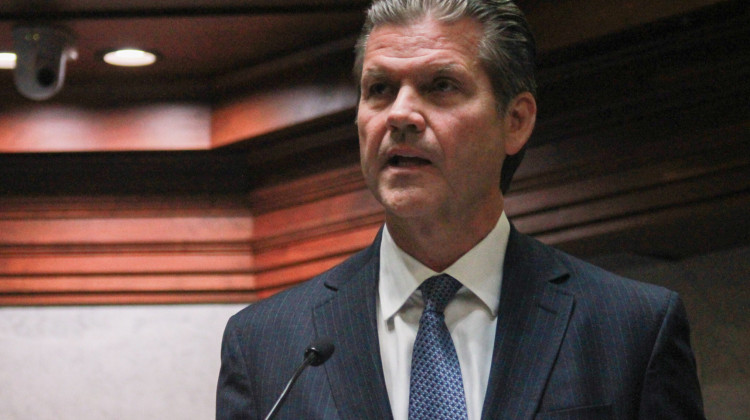
The former headquarters for Indiana Virtual School and Indiana Virtual Pathways Academy on East 96th Street in Indianapolis.
Eric Weddle/WFYI NewsAn investigation by the Indiana State Board of Accounts says a quest to “maximize profit” at two virtual charter schools led its leaders to inappropriately collect more than $68.7 million in tax dollars by inflating student enrollment numbers for years.
The report, released Wednesday, also found Indiana Virtual School and Indiana Virtual Pathways Academy made improper payments of more than $85 million in public funds to multiple companies linked to school officials and their family members. More than 90 percent of the payments were made without invoices or with invoices lacking details of service, according to the report.
READ MORE: State Board of Accounts's Special Investigation of Indiana Virtual Education Foundation
Thursday, state lawmakers of both parties called the findings “criminal” yet disagreed whether policies could have prevented the wrongdoing laid out in the report.
Last year, school officials for Indiana Virtual School and Indiana Virtual Pathways Academy denied wrongdoing.
Both schools were forced to close last summer after state investigators said the school officials exaggerated enrollment in an effort to collect more state funding. At the time, state education leaders said the schools were overpaid $40M in tuition support.
The 47-page report by the State Board of Accounts, released Wednesday, Feb. 12, expands on what was previously known about how the schools operated, including the number of students counted for enrollment who never attended classes, and the lack of oversight in the financial and education operations.
It also details how annual enrollment counts included children who merely requested information about programs. The enrollment count is used to calculate how much state money schools receive. In Indiana, schools receive a particular amount of tuition support for each student enrolled during a certain time period.
The state is demanding individuals who oversaw both schools repay tens of millions in tuition support and improper payments to vendors.
The report also states it found no evidence whether Daleville Community Schools, the public school district who authorized and oversaw both virtual charter schools, provided adequate oversight.
Daleville, a small district northeast of Indianapolis, authorized a charter for Indiana Virtual School in June of 2011. An additional online charter school, Indiana Virtual Pathways Academy, was authorized in 2017. The district revoked the charters for both schools last August after alerting state officials about enrollment concerns.
The State Board of Accounts sent the findings to the Indiana Attorney General’s office.
Last summer, a U.S. District Court Attorney issued a subpoena to the charter schools for
evidence. School officials were also called before a federal grand jury.
Here are some of the report’s findings:
Enrollment
The report says staff at both schools showed “a substantial disregard for compliance obligations and reporting requirements” and were rather “focused on maximizing profits and revenues by exploiting perceived vulnerabilities in the authorizer's oversight and state reporting and tuition support disbursement processes.”
A review of students at the schools across 11 years found more than 8,500 that were improperly included in enrollment counts. Of those, there were 4,706 instances where students completed no courses.
The majority of the ineligible students were counted during the 2016-17 and 2017-18 school years.
“Multiple interviews with students within this population confirmed they never took or completed any courses,” the report says.
The review also found the staff at the schools: enrolled students that had not expressed any intention to enroll; re-enrolled students that had been withdrawn for lack of participation and also had not subsequently indicated any intention to re-enroll, and staff listed students on enrollment reports that did nothing beyond request information from the schools' website.
A student who died before the enrollment count in the 2016-2017 school year was included in the county and again for the 2017-2018 school year.
In 2017, lawmakers voted that virtual schools must unenroll students who show no online activity. IVS and IVPA adopted policies that required students to be logged into class on a “daily/weekly basis” and complete assignment “a minimum of three times per week.” Students who don’t engage with the system for 20 days, the policy states, will be withdrawn.
Auditors found nearly 6,000 students who should not have been included in enrollment tallies based on the schools’ own policy. This resulted in the state overpaying the schools $27.4 million.
Payments And Related Companies
During the last three years, the schools received a total of $103.8 million in state funding. Of that money, 83 percent was paid to vendors linked to company officials.
Some of the payments were made to companies linked to Thomas H. Stoughton and Merle Bright.
Stoughton was the board president of IVS for six years. During two years of that time, he was president of AlphaCom. The company received nearly $14.2 million for providing educational services to both schools. Nearly all the invoices for these payments or missing or lacking details, according to the report.
Bright was not a board member for either virtual school, yet he had access to the schools’ bank accounts and signed checks for three months in 2018 in excess of $6.8 million to companies he was related to. Bright, according to the report, is either the owner or an officer of ten corporations that received payments for providing educational services to the schools. Those companies, including American Pathways Academy and Eightbit Designs and Cyber Educational Services, received more than $84M dollars in payments from the schools.
Greg Bright, a family member of Merle Bright, was paid $522,000 for financial services. More than half the total amount paid was not invoiced or the invoices lacked proper details for services.
The payments were based on percentages of revenues from state funding and fees charged for each student enrolled.
“Therefore, as revenues from state funding increased, including overpayments for ineligible students, amounts paid to these vendors also increased,” the report says.
A 2017 Chalkbeat investigation found the Indiana Virtual School paid the company millions of dollars while it was run by the schools’ founder Stoughton. Soughton sold his interest in AlphaCom.
Stoughton and Bright could not be reached for comment Thursday.
The Response
State lawmakers from both parties decried the alleged criminal activity.
House Speaker Brian Bosma (R-Indianapolis) says the school leaders were not stopped by laws in place for property reporting enrollment and other information.
“That's criminal. And this appears to be criminal in nature. And hopefully, the authorities will be pursuing this to the fullest extent of the law, both to recover funds and to enforce criminal penalties,” Bosma says.
He also blames Daleville and the Department of Education.
“(I) express a lot of disappointment in the Department of Education, that is to audit these ADM requirements. (They) clearly did not in this situation, and I think they'll be a lot of questions asked about that as well,” he says.
Department of Education spokesperson Adam Baker pushed back on Bomsa’s comment. He said in a statement that the department has fully corporated in the investigation.
“To blame the Department of Education for the malfeasance at these schools is unwarranted and counterproductive, as we have worked within our legislatively created authority and capacity,” Baker said. “The legislature has created a system where the responsibility to oversee a charter school’s compliance with state and federal law lies with the charter school’s authorizer. (State Superintendent Jennifer) McCormick has been clear on the need for more legislated fiscal transparency and accountability over charters and will continue to advocate accordingly.”
Rep. Ed DeLaney (D-Indianapolis) called the release of the report, “a very bad day for Indiana” and said Bosma declined to study virtual schools in a summer committee last year.
“It's way overdue for this body to accept responsibility … for our utter failure to oversee these schools,” DeLaney says about the General Assembly. “And I have told my friends on the other side of the aisle for several years, that you're killing your so-called choice movement by supporting these virtual schools -- they are a threat. That threat has come home and it's hit the taxpayers in the wallet. And I hope to God that we will pay some attention.”
In a statement, Daleville School leaders said they are still analyzing the report but they do have concerns that district assistant superintendent David Stashevsky is named in it. Stashevsky was leading Indiana Virtual School in its first year until mid-2012. The audit found three students counted that school year who did not complete any course work.
“... we believe his inclusion in the report as a potentially responsible party is in error,” the statement said.
Former representatives from the two virtual charter schools could not be reached for comment Thursday.
Indiana Public Broadcasting's Brandon Smith contributed to this report.
Contact WFYI education reporter Eric Weddle at eweddle@wfyi.org or call (317) 614-0470. Follow on Twitter: @ericweddle.
 DONATE
DONATE







 Support WFYI. We can't do it without you.
Support WFYI. We can't do it without you.